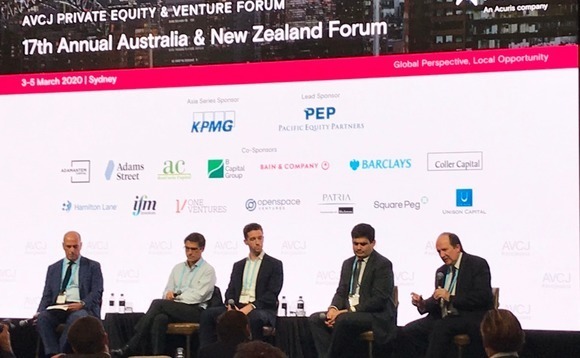
ESG-related deals must be judged on commercial merits – AVCJ Forum

Institutional investors in Australia have reaffirmed their commitment to environment, social and governance (ESG) protocols – but as a factor within the decision-making process, not its sole driver.
"We would like to think we have – and I think we do have – a A$12.5 billion ($8.3 billion) ESG portfolio, it is embedded in everything we do," John Peterson, alternatives portfolio manager at Local Government Super, told the AVCJ Australia & New Zealand Forum. "But there are some things we don't do. I know some of our peers say they will allocate X to impact investing or to a fund that meets certain obligations and requirements. We will never do that. Every single investment has to stand as an investment."
Australian institutional investors have come under increasing pressure in recent months regarding their environmental credentials. It follows a 2019-2020 bushfire season in which drought and record temperatures contributed to the destruction of 11 million hectares of bush, forest and parks, claiming 33 lives in the process. Scientists have connected the issue to global warming.
Last month, 10,000 members of UniSuper – the default superannuation fund for Australia's academics, scientists, researchers and university employees – signed a petition demanding the divestment of their retirement funds. Rather than leading the charge on climate change, UniSuper is plowing billions of dollars into "companies whose operations and plans are completely incompatible with the climate goals of the Paris Agreement," the petition reads.
UniSuper, Hostplus, HESTA and AustralianSuper were earlier identified by The Age and The Sydney Morning Herald as having "billions of dollars invested in coal producers and other fossil fuel companies despite taking a vocal stance on climate change and pledging to support emissions reduction." UniSuper said it had no plans to unwind the A$170 million it has invested in 14 thermal coal companies nor its holdings of A$7.82 billion in oil and gas producers.
Vanguard, BlackRock, and J.P. Morgan faced a similar backlash on a global level last year. BlackRock subsequently promised to exit its thermal coal investments, while J.P. Morgan pledged to stop lending to companies involved in coal mining or oil drilling in the Arctic. Hostplus and HESTA responded to the recent criticism by saying that holding shares in fossil fuel companies gave them the ability to influence behavior and that divestment would not achieve this end.
Shaun Manuell, a senior portfolio manager at AustralianSuper, declined to comment on his organization's thermal coal exposure, citing commercial confidence. "Of course, it's an active discussion at the moment," he told the forum.
However, Manuell also observed that ESG is one subset of investment decision making at AustralianSuper, though an important one. "When we take that coal debate, we analyze it: What does the revenue profile look like? What does the expense profile look like? What is the appropriate discount rate? Then we make the decision. Rather than say thermal coal is good or bad, we say, let's think about what thermal coal looks like in the investment process," he explained.
Diversity is another area of increasing focus for institutional investors. Gender diversity is often highlighted in an Australian context, given the claim that there is currently only one female partner working in private equity in the country who has deal responsibility - Stephanie Charles at BGH Capital. Venture capital is doing slightly better with four female partners.
Serge Allaire, a portfolio manager at MLC Private Equity, said that diversity has become a more prevalent issue. He noted that GPs are becoming more balanced at the junior levels and it would take time for change to occur in the more senior ranks. "The journey is long, but we are explicitly pushed by our investment committee to influence that movement," Allaire said.
Manuell added that the increasing pressure being placed on listed companies to promote gender equality at board and management level would filter through to the private markets. AustralianSuper's current priority is "on our own embarrassing situation, trying to change the profile of our own investment department," he stressed, while observing that it has proved difficult to attract women into the graduate program.
Latest News
Asian GPs slow implementation of ESG policies - survey
Asia-based private equity firms are assigning more dedicated resources to environment, social, and governance (ESG) programmes, but policy changes have slowed in the past 12 months, in part due to concerns raised internally and by LPs, according to a...
Singapore fintech start-up LXA gets $10m seed round
New Enterprise Associates (NEA) has led a USD 10m seed round for Singapore’s LXA, a financial technology start-up launched by a former Asia senior executive at The Blackstone Group.
India's InCred announces $60m round, claims unicorn status
Indian non-bank lender InCred Financial Services said it has received INR 5bn (USD 60m) at a valuation of at least USD 1bn from unnamed investors including “a global private equity fund.”
Insight leads $50m round for Australia's Roller
Insight Partners has led a USD 50m round for Australia’s Roller, a venue management software provider specializing in family fun parks.







